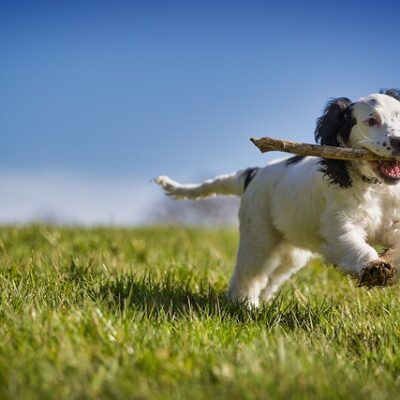Can puppies drink milk? In short, yes. Puppies can drink milk, but as all things consumed, it should be in moderation and monitored. It is important to note that a high percentage of dogs are lactose intolerant to dairy products. Veterinarians recommend that dairy products should only be given to dogs in small doses. Read more to find out about milk alternatives, possible effects of dairy consumption, and frequently asked questions.
Busy? Get Your Hands Paws On The Answers Quickly…
- Can Dogs Drink Milk?
- Is Milk Good Or Bad For My Dog?
- What Are Symptoms Of Lactose Intolerance In Dogs?
- Can Dogs Drink Milk Alternatives? Soy, Almond, Goats
- FAQs
Most dog owners will drink milk themselves and will more than likely give some to their furry friends. The most common type of milk in someone’s household is cows, but can puppies drink cow’s milk too? In short, the answer is yes.
Experts suggest that a high percentage of puppies have difficulties digesting the lactose (a natural sugar found in dairy products). This is where the term “lactose intolerant” comes from, which is common in dogs, cats, and humans.
If you think your dog is lactose intolerant, cow’s milk might not be the best choice for your dog. What are the symptoms of lactose intolerance? How do you know your dog struggles to digest dairy products? Read more to find out the answer to these questions as well as much much more.
IS MILK GOOD OR BAD FOR MY DOG?
Well, if your dog is not lactose intolerant and can digest dairy products, milk has plenty of positives. It provides high levels of calcium and protein as well as vitamins such as D & B12.
Veterinary experts suggest puppies and adult dogs should drink plenty of water but given milk as an alternative sweet treat as it contains natural sugars and high levels of fat. If dogs are consuming foods and drinks that provide this level of fat, obesity can become a real issue. Therefore, these types of foods should be given in moderation.
Lactose Intolerance in Dogs
Dairy products are the leading cause of food intolerance in dogs, as a high percentage of dogs are lactose intolerant, which means they will find it difficult to digest milk. Some lactose-intolerant dogs will manage to digest milk but not other dairy products like cheese, yogurt, and vice versa. Different dogs have difficulties digesting all dairy products.
WHAT ARE THE SYMPTOMS OF LACTOSE INTOLERANCE IN DOGS?
You might have noticed that your pup had plenty of milk from their mother without showing any symptoms. This is because dogs milk has a lot less lactose than that of cow’s milk. Some dogs can have as little as a drop of milk, and their stomachs will react negatively while other dogs could drink bowl after bowl.
If you’ve given your dog milk for the first time, I’m sure they lapped it up, licked their lips, and treated it like any other meal. However, there may be some symptoms that follow, which give you an indication of whether your dog is lactose intolerant or not.
Lactose intolerant symptoms:
> Excessive Pooping
> Gas
>Abdominal pains
> Diarrhea
> Vomiting
CAN DOGS DRINK MILK ALTERNATIVES? SOY, ALMOND, GOATS.
We’ve only mentioned cow’s milk thus far. However, we pose the question; Can dogs drink milk alternatives? Are Goats milks suitable for dogs? Is it ok for dogs to drink soy milk? Are dogs allowed to drink almond milk? We will be answering these types of questions in this next section.
Goats Milk
Many veterinarians are now recommending goats milk over cow’s milk as a healthier option for dogs. But Is this true?
Well, goat’s milk is higher in some nutrients such as calcium and potassium but lower in other vitamins like B12 and folate. Raw goat’s milk has lower lactose levels than that of cow’s milk; this could be the reason for vets recommending this variety of milk.
Researchers suggest that the lower levels of fat and protein in goat’s milk make it easier for your dog to digest. Moreover, dogs with specific dairy allergies are less likely to be affected when drinking goat’s milk.
However, just like all “human” foods, goat’s milk should be given as a treat once in a while and not be given to your dog regularly.
Almond Milk
So, the vet confirms your pup is lactose intolerant, and his night time treat of milk can no longer be given. As an owner, you might be thinking of alternative options and be asking yourself; What about almond milk?
As a non-dairy product, almond milk sounds like a suitable replacement for regular high lactose milk. However, there are a few other things to be aware of; some nuts can be highly toxic to dogs and cause severe problems. Thankfully, almond nuts aren’t one of them. It should be noted that dogs do not digest almond nuts (whole) very well and they can cause some stomach problems. They’re also high in fat, which can ultimately lead your dog to become obese or suffer from pancreatitis.
That being said, a small drop of almond milk from time to time will not harm your dog. It is of high importance that you read the labels of the milk and ensure that there are NO added sweeteners to the milk, such as xylitol, as this is highly toxic for dogs.
Soy Milk
Just like almond milk, soy is ok for dogs to consume. Soy is a plant-based alternative and is, in fact, an ingredient in most shop-bought dog foods. It is worth noting that soy should be consumed in small doses as it is high in sugar and calories, which is not good for your dog.
Some dogs may be allergic to soy, so as always with new products, closely monitor their behavior/symptoms after consumption.
Evidence suggests soy is perfect for the cholesterol system in humans and works similarly in dogs. It can reduce urinary incontinence in dogs too.
What can puppies drink?
For smaller pups, their mother’s milk is the best option for a drink in the early stages of their life. This can not always be an option, as an alternative, a bottle-fed powdered formula for dogs will be a suitable replacement.
How often do puppies poop?
A lot of factors can determine how often your dog poops. However, it usually is between 1-5 times a day.
When do puppies lose their teeth?
Puppies generally have 28 “milk” teeth that come through at about four weeks. These milk teeth will tend to fall out between 14 to 30 weeks. For more information about your pup and their teeth, read our article “When do puppies lose their teeth”?
When do dogs stop growing?
This depends on the breed and size of the dog. Larger dogs will tend to stop growing when they reach the age of 12 to 18 months, and smaller dogs stop growing when they reach 6 to 8 months. You can find all the information you need to know by reading our article “When do dogs stop growing”?
Looking for more pawsome posts? Check these out…
Can Dogs Eat Lettuce?
How To Make A Snuffle Mat
When Do Puppies Lose Their Teeth?
Can Dogs Eat Broccoli?
Can Dogs Eat Watermelon?
Disclaimer: Each dog is different, and every circumstance is different. All efforts have been made to provide accurate information. However, it is not provided by a qualified Veterinarian, Veterinarian Surgeon, or Behaviorist. The information provided is purely educational. The information should not be used as an alternative or substitute for medical care. If you have any health or medical concerns, contact a qualified Veterinary Surgeon or Veterinarian immediately.











No Comment! Be the first one.